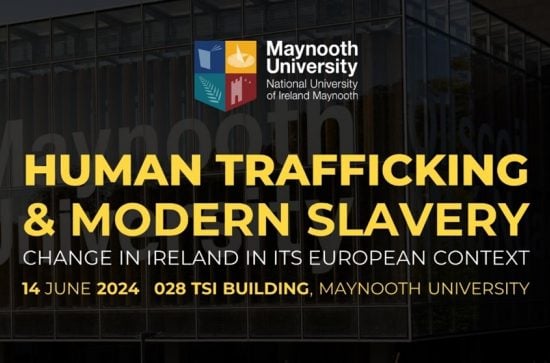
On 14 June the School of Law and Criminology, in collaboration with the Department of Applied Social Studies and Maynooth University Social Sciences Institute (MUSSI), hosted a hybrid international event addressing Human Trafficking and Modern Slavery: Change in Ireland in its European context. This event was coordinated jointly by Dr Niamh Flanagan (Associate Professor in Applied Social Studies), Dr Clíodhna Murphy (Associate Professor in Law), and Dr Rhiannon Bandiera (Lecturer/Assistant Professor in Criminology).
Professor Alex Balch of the Modern Slavery and Human Rights Policy and Evidence Centre (Modern Slavery PEC) and the University of Liverpool delivered the keynote address on ‘An engaged research approach for policy on modern slavery and human trafficking in the UK.’ Professor Balch drew on his extensive experience, as both a researcher and an assessor of funding applications, to discuss how research can inform evidence-based policy in this field. His address also highlighted structural barriers to the meaningful engagement of people with lived experience of severe exploitation in research projects and outlined some promising practices in this regard.
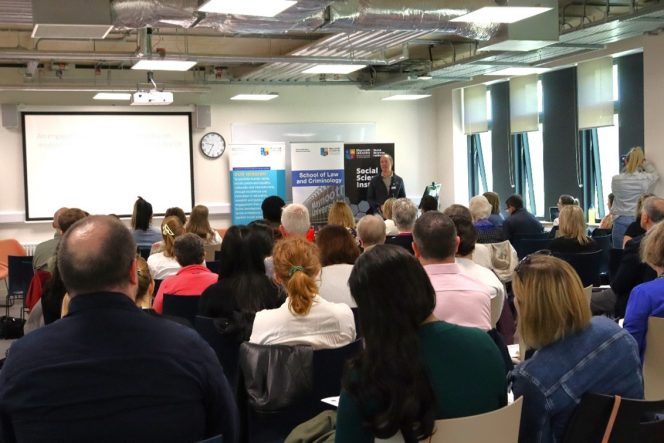
The first panel, on business, due diligence and human rights with a modern slavery take, was opened by Dr Murphy with a discussion on modern slavery—a concept not yet formally incorporated in Irish law, but commonly used in several other common law jurisdictions. For the purposes of the panel, it was defined as an umbrella term for extreme forms of human exploitation, including slavery, servitude, forced labour, forced marriage, debt bondage, and human trafficking. Michael O'Brien of the International Transport Workers Federation (ITF) conveyed the difficulties in measuring the extent of and responding to modern slavery in the fisheries industry, which raises unique challenges because of the remoteness of this exploitation and jurisdictional complexity. Aké Achi, the Founder of Migrants at Work Ltd and with lived experience of modern slavery, argued that modern slavery should be conceived as ‘homegrown slavery’—that is, as being created by states or ‘slave trade by proxy’ whereby the state is the ‘slave mastermind’. He drew on the UK and its immigration and labour laws to demonstrate how these laws lead to the exploitation of migrants. Dr Bandiera built on this discussion by situating those harms caused by modern slavery with both states and corporations, drawing on the experiences of Australia in legislating on modern slavery and how this legislating can be conceived as a form of ‘state-corporate benevolence’—that is, giving the appearance of acting rather than actually acting on modern slavery. Ross Fitzpatrick from Christian Aid spoke in detail about the processes which led to the adoption of the EU's Corporate Sustainability Due Diligence Directive (CSDDD), including the compromises that were made and attempts by EU states to kill the law outright. Laura Morrison, senior adviser with Business In The Community Ireland, wrapped up the panel by explaining how, in spite of some of its limitations, the CSDDD had prompted businesses to think more deeply about the social context of their operations and value chains and the consequences their actions create for people—a ‘push’ by business that ‘hasn’t really been there before’.
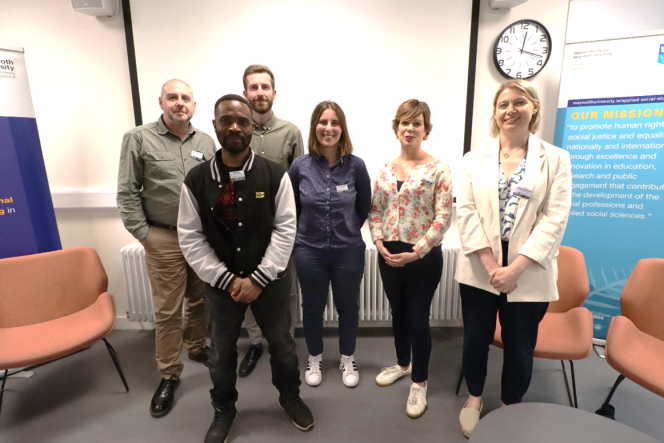
The second panel, on identification and support of victims/survivors of human trafficking in Ireland, was opened by Dr Flanagan with a presentation on the status of identification of child victims of trafficking in Ireland. The panel spanned the issue from policy making, to frontline identification and support, to advocacy, concluding with an academic critique of international legislation governing identification of victims. Ben Ryan, Assistant Secretary General in the Department of Justice (Ireland) offered an overview of forthcoming legislation which will introduce, and place on a statutory footing, a revised National Referral Mechanism (NRM) for identification and support of victims. Kathryn McGrath, Manager of the Anti-Human Trafficking and Women’s Health Services Team in the HSE, switched the focus of discussion from policy to frontline work, describing the type of work done and discussing what the future holds in the context of the new NRM. Bill Abom of the Migrants Rights Centre of Ireland (MRCI), shifted the focus again to advocacy work with victims of trafficking, highlighting the primacy of empowerment in supporting people who have experienced trafficking. Overlaying the discussion with an academic critique of international legal obligations to identify victims, Dr Gillian Kane of the School of Law in Ulster University wrapped up the panel presentations. In response to questions from the floor, the panel further explored pillars of the forthcoming NRM, addressing implementation of protection such as eligible trusted partners, training and attitudinal impacts; increased prosecutions, challenges associated with international legislation, and Irish legislation on recruitment fees; and Ireland’s role in preventing human trafficking which arises outside the jurisdiction.
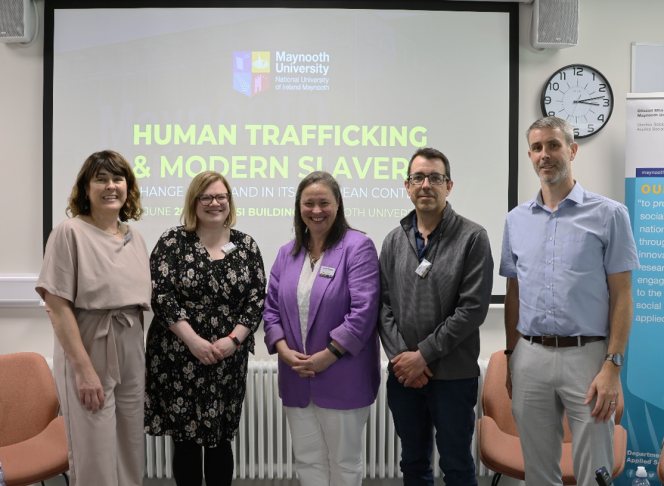
The closing address was delivered by Dr Nusha Yonkova, Head of the Anti-Trafficking Unit at the Irish Human Rights and Equality Commission (IHREC), which is Ireland’s Independent National Rapporteur on Human Trafficking. Dr Yonkova analysed the legal changes contained in the Criminal Law (Sexual Offences and Human Trafficking) Bill 2023, which has now been signed into law as the Criminal Law (Sexual Offences and Human Trafficking) Act 2024, and the EU’s recast Anti-Trafficking Directive. In the Question & Answer session, Dr Yonkova highlighted a range of issues, including the importance of being guided by the expertise of those with lived experience, and of practical victim support measures such as the provision of suitable accommodation.
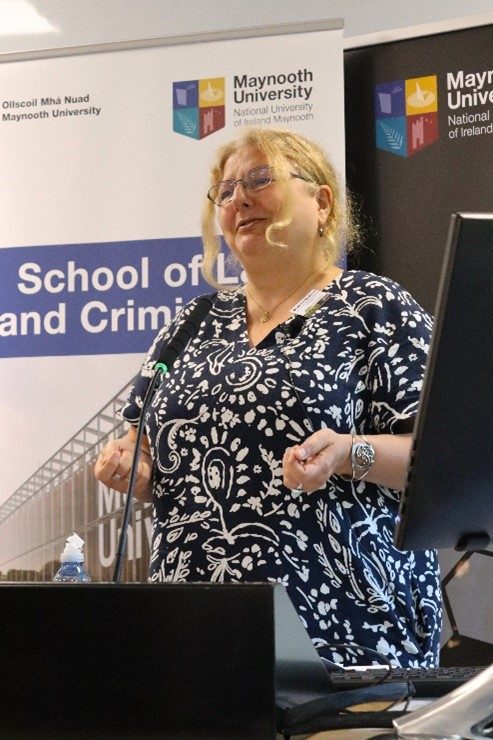
The event was funded by MUSSI, Department of Applied Social Studies, and School of Law and Criminology and organised with support from the Research Centre in International Justice (hosted within the School of Law and Criminology).
A full recording of the event is available to view on YouTube:
